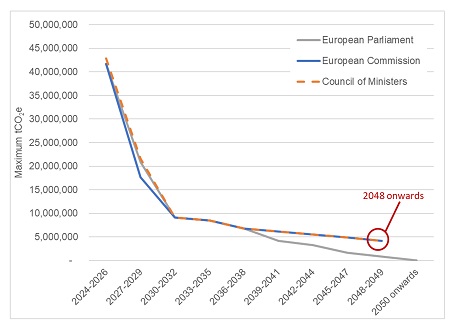F-gas proposals – latest updates

The proposed revisions to the EU F-gas regulation were recently debated by the EU Council of Ministers who agreed to relax some of the bans originally proposed by the European Parliament. That the Parliament proposed a more stringent phase down is not surprising as they have a more ambitious phase down scenario than the Council of Ministers and European Commission (who have very similar phase down targets – see graph).
 Much of the revision in the regulation is related to heat pumps and air conditioning systems. Significantly the proposal makes a distinction in the bans between HFCs and ‘fluorinated greenhouse gases’ (meaning HFCs and HFOs). This covers prevention of emissions, leak checks, record keeping, recovery and labelling.
Much of the revision in the regulation is related to heat pumps and air conditioning systems. Significantly the proposal makes a distinction in the bans between HFCs and ‘fluorinated greenhouse gases’ (meaning HFCs and HFOs). This covers prevention of emissions, leak checks, record keeping, recovery and labelling.
One major change is related to a new clause that covers stationary self-contained systems. A stationary system means not normally in transit during operation. Self-contained systems are defined as a complete factory-made refrigerating system in a suitable frame and/or enclosure, that is fabricated and transported complete in which no refrigerant-containing parts are connected on site[1]. The clause will ban from 1 January 2025 stationary self-contained refrigeration equipment with F-gases that have a global warming potential (GWP) of 150 or more (except when required to meet safety requirements). It also appears to remove the derogation allowed for applications designed to cool products to temperatures below – 50°C if they fall within the stationary self-contained definition. Systems that now come under this 150 GWP clause include items such as laboratory equipment, ice makers, small ice bank drinks coolers and small water chillers. Although some of these may already apply hydrocarbons there are examples where manufacturers will have to make significant updates, especially where the -50°C derogation has been applied. Previously only domestic and some commercial equipment has been included in the 150 GWP limit.
Further negotiations will now take place to decide the final amendments to the regulation. This is relatively complex and involves the European Parliament, Council and Commission reaching an agreement.
Whatever the phase down scenario, it is clear that the f-gas regulations will be updated. It is likely that higher GWP refrigerants will become more scarce and more expensive. Therefore, whether you are concerned about the current, or proposed F-gas regulations, it is essential to plan ahead to ensure that refrigeration equipment can remain in operation or can be replaced a part of a planned process.
If you are interested in the new regulations and would like any advice, then please contact Judith Evans (j.a.evans@rdandt.co.uk) at RD&T.
[1] 20230317-Industry-joint-amendment-proposals-on-F-Gas-Regulation-Revision.pdf (epeeglobal.org)